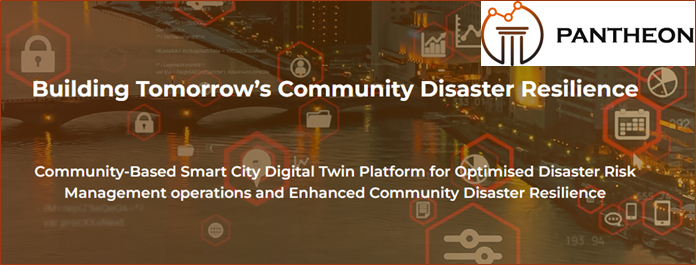
27 Oct Building Tomorrow’s Community Disaster Resilience
Current challenges
In the past two decades, the international disasters database EM-DAT has recorded 7,348 natural disasters resulting in the loss of 1.23 million lives and affecting over 4 billion others. These environmental catastrophes have caused a total of €2.77 trillion in economic damages worldwide, without even including biological or technological disasters.
Building Tomorrow’s Community Disaster Resilience
The PANTHEON project joins the fight against both natural and man-made disasters by upgrading the existing disaster resilience models. Through the development of tools for evidence-based, policy-making analysis and evaluation of various issues and criteria, our mission is to build a community-based digital ecosystem for Disaster Resilience. Integral to this initiative is the implementation of Smart City Digital Twin (SCDT) technology, which offers a more precise way to assess potential disasters and their consequences, supported by in-depth analysis of regional policies, models, and legal/regulatory environments.
Disaster Risk Management of the future is possible, and the PANTHEON consortium works meticulously to provide communities with enhanced tools thanks to the availability of real-time data, thus improving decision-making efficiency during and after disasters.
Engagement and involvement of community-based disaster risk management stakeholders
Effective stakeholder involvement means bringing together representatives from key stakeholders and users with different viewpoints. This provides an opportunity to explain objectives and concerns, questions different viewpoints and eventually to resolve some of the perceived conflicts through better mutual understanding.
Become a member of “PANTHEON STAKEHOLDERS GROUP” established on CMINE.EU.
This is the procedure to become a member:
- To register on CMINE here: https://www.cmine.eu/signup
- Once you have done that and logged-in, you can go straight to the PANTHEON Group https://www.cmine.eu/topics/37356 and request membership

Project Info
- Title: PANTHEON: Community-Based Smart City Digital Twin Platform for Optimised Disaster Risk Management Operations Enhanced Community Disaster Resilience
- Starting date: 1st January 2023
- Duration: 36 months
- Coordinator: TWI Hellas
- Consortium: 17 partners from 9 countries
- Webpage: https://pantheon-project.eu/
- LinkedIn: https://www.linkedin.com/showcase/pantheon-project/
This project has received funding from the European Union’s Horizon Europe programme.
Author(s): Alena DIKOŠOVÁ, International Security and Emergency Management Institute




